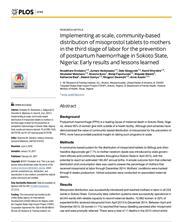Postpartum haemorrhage (PPH) is a leading cause of maternal death in Sokoto State, Nigeria, where 95% of women give birth outside of a health facility. Although pilot schemes have demonstrated the value of community-based distribution of misoprostol for the prevention of PPH, none have provided practical insight on taking such programs to scale. A community-based system for the distribution of misoprostol tablets and chlorhexidine digluconate gel to mother-newborn dyads was introduced by state government officials and community leaders throughout Sokoto State in April 2013. A simple outcome form that collected distribution and consumption data was used to assess the percentage of mothers that received misoprostol at labor through December 2014. Mothers' conditions were tracked through 6 weeks postpartum. Verbal autopsies were conducted on associated maternal deaths.
Misoprostol distribution was successfully introduced and reached mothers in labor in all 244 wards in Sokoto State. Community data collection systems were successfully operational in all 244 wards with reliable capacity to record maternal deaths. 70,982 women or 22% of expected births received misoprostol from April 2013 to December 2014.
It was concluded that it is feasible and safe to utilize government guidelines on results-based primary health care to successfully introduce community distribution of life saving misoprostol at scale to reduce PPH and improve maternal outcomes. Lessons from Sokoto State's at-scale program implementation, to assure every mother's right to uterotonics, can inform scale-up elsewhere in Nigeria.
Authors: Nosakhare Orobaton, Jumare Abdulazeez, Dele Abegunde, Kamil Shoretire, Abubakar Maishanu, Nnenna Ikoro, Bolaji Fapohunda, Wapada Balami, Katherine Beal, Akeem Ganiyu, Ringpon Gwamzhi, Anne Austin


